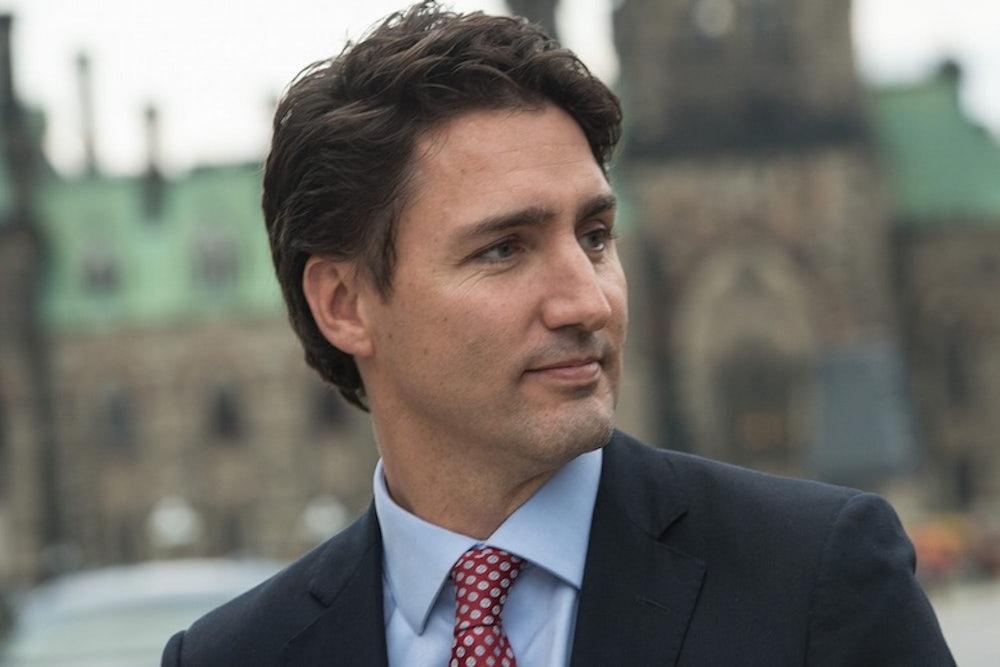If, as Henry Kissinger famously remarked, “power is the ultimate aphrodisiac,” it would seem that the role of Canadian prime minister has recently taken on an unprecedented global influence. Trudeau, let it be noted, isn’t merely good-looking. He’s a specific category of good-looking, and it’s not the acquired-taste, scruffily-weathered, could-teach-a-girl-a-thing-or-two sort. He’s more the kind of hot that elicits giggles in tweens. (He’s been compared with my own preferred teen-years idol, the musician Rufus Wainwright, perhaps because they’re both scions of Canadian dynasties, but an image search might lead to the conclusion that this is about the hair.) There’s nothing subtle or subjective about his physical appeal. He is, in other words, a “pretty boy.” In even mentioning this, I suppose I’ve made it clear where I stand in the much-raging debate over whetheritis or isnot OK to objectify Justin Trudeau, and reiterated my position the ongoing feminist one over whether appreciating men’s physical attributes helps or hurts the cause.
The entire category of pretty boy is a borderline-misogynistic construction, tinged with a hint of homophobia. It feminizes and infantilizes men for being straightforwardly good-looking—unless in a very particular, muscle-bound way—suggesting that “serious man” and “generally-recognized object of physical attraction” are mutually exclusive. Thus the headlines about whether Trudeau had been able to “overcome” his pretty boy reputation. (Yes he had, argued Vanessa Friedman in a New York Times “Unbuttoned” column, illustrated with a disappointingly buttoned photo of the new leader.)
But perhaps more important, pretty boy also infantilizes and trivializes female heterosexual attraction. There’s an implicit distinction between male prettiness and the sort of things it’s imagined a grown woman ought to be attracted to in a man: status, money, stability. It’s good and well for men to be attracted to prettiness, but it’s treated as somehow perverse or incomprehensible the moment a woman has the same preference. And it’s there, I think, that we can place the discomfort Trudeau’s heartthrob qualities apparently inspire. There’s something suspect not so much about a male politician inspiring female lust, but about a male politician doing so with his looks rather than with his power.
When embracing dude-objectification as a feminist cause, there’s a danger of veering off into slightly condescending territory: The notion of grown women experiencing being attracted to men is too often treated less as something women actually experience, and more as something vaguely amusing, cheesy, and put-on. Which detracts from the feminist… point. It’s not that, principle-of-the-thing, men should be subjected to ogling. It’s that many straight and bisexual women were already inclined to do that sort of admiring, but had been holding back, largely because female appreciation of male beauty is treated as a phase to outgrow.
The advantage to reclaiming “pretty boy” is that it reminds that the word “pretty” has no gender. A few weeks back, I read, with interest and much nodding, Dodai Stewart’s reaction to Playboy’s decision to stop publishing nudes. Stewart declared the magazine’s aesthetic irrelevant, noting that “all kinds of women are found attractive by all different types of people, and have been, for centuries.” True! But she only briefly, near the end of the piece, alluded to the fact that sexy isn’t only a trait found in women. I could take this moment to offer a point-by-point case for why men, too, can have that quality, or I could suggest that you image-search Trudeau.
To celebrate the pretty boy is to celebrate female sexual agency. It’s a pushback against the bleak dynamic Rebecca Traister recently described as reigning on college campuses, where “consent” conversations are ubiquitous, but where there isn’t quite so much attention paid to whether women are actually enjoying the sex to which they’ve consented. My point isn’t that every last woman’s type is “pretty boy” (or “-boy,” period!). It’s that the term (when used in a heterosexual context) evokes a kind of erotic or just aesthetic experience whose aim is female enjoyment, and not the kind of “female enjoyment” that’s done for the benefit of men.
The problem with the symbol of male prettiness being a politician is, of course, that the collective swoon seems to reinforce an existing negative stereotype about women, namely that we’re too frivolous to care about The Issues. In this case, though, it’s a bit much—most people in the world are not losing sleep over which moderate-by-U.S.-standards, innocuous character gets picked to lead Canada. (Does the typical man in, say, the U.S. or UK have a deep knowledge of Trudeau’s approach to ISIL? I thought not.) The alternative to the world discussing Trudeau’s hotness wasn’t the world discussing Trudeau’s approach to cultural diversity and the niqab, or the Canadian Liberal Party’s platform. It was the world not knowing Canada had a Liberal Party.
And there’s no reason to think that within Canada, the demographics spending their lunch hours scrolling through Trudeau haircut slideshows have been seduced into supporting policies they wouldn’t have otherwise. An already progressive Western country has been jolted a ways to the left. The think-piece reckoning over what to make of Trudeau’s "not just politician-hot" (as Gabrielle Bluestone put it) looks are a sign not that women only care about the superficial, but that we as a society are no longer at a place where a man's prettiness can go unremarked. It’s high time we reclaimed “pretty boy.”
